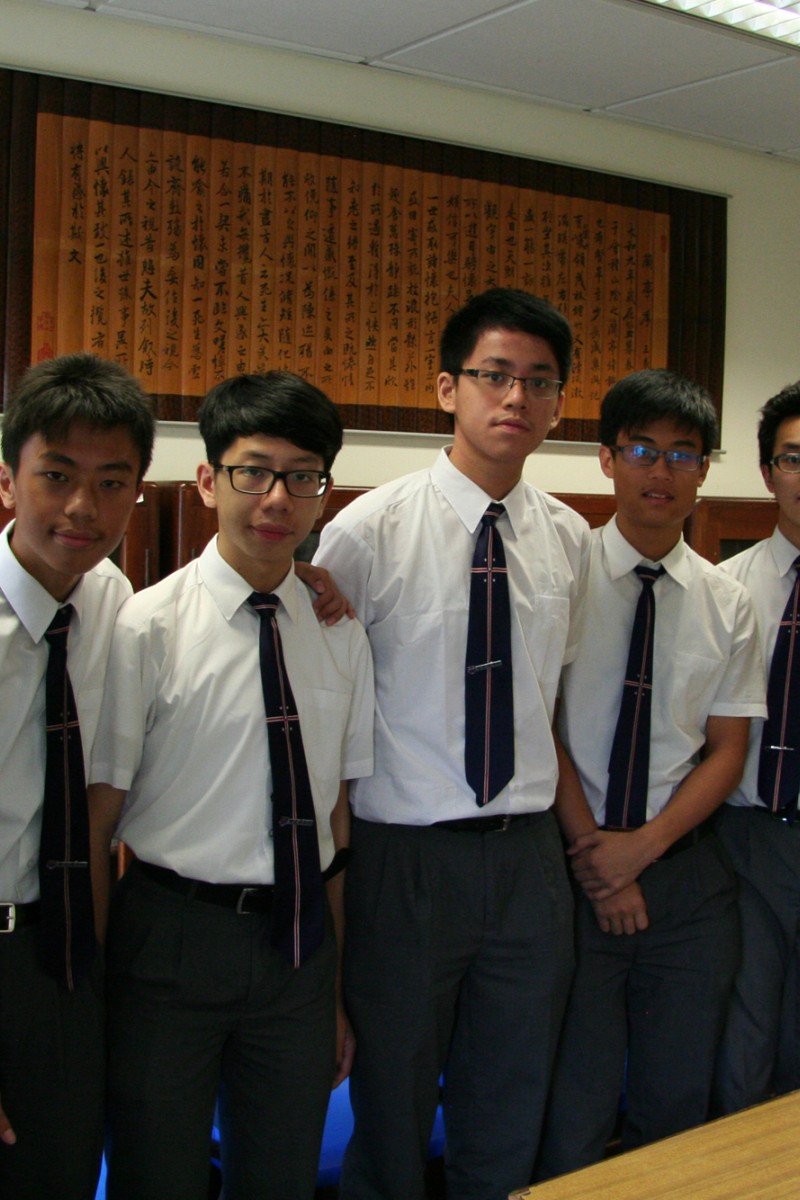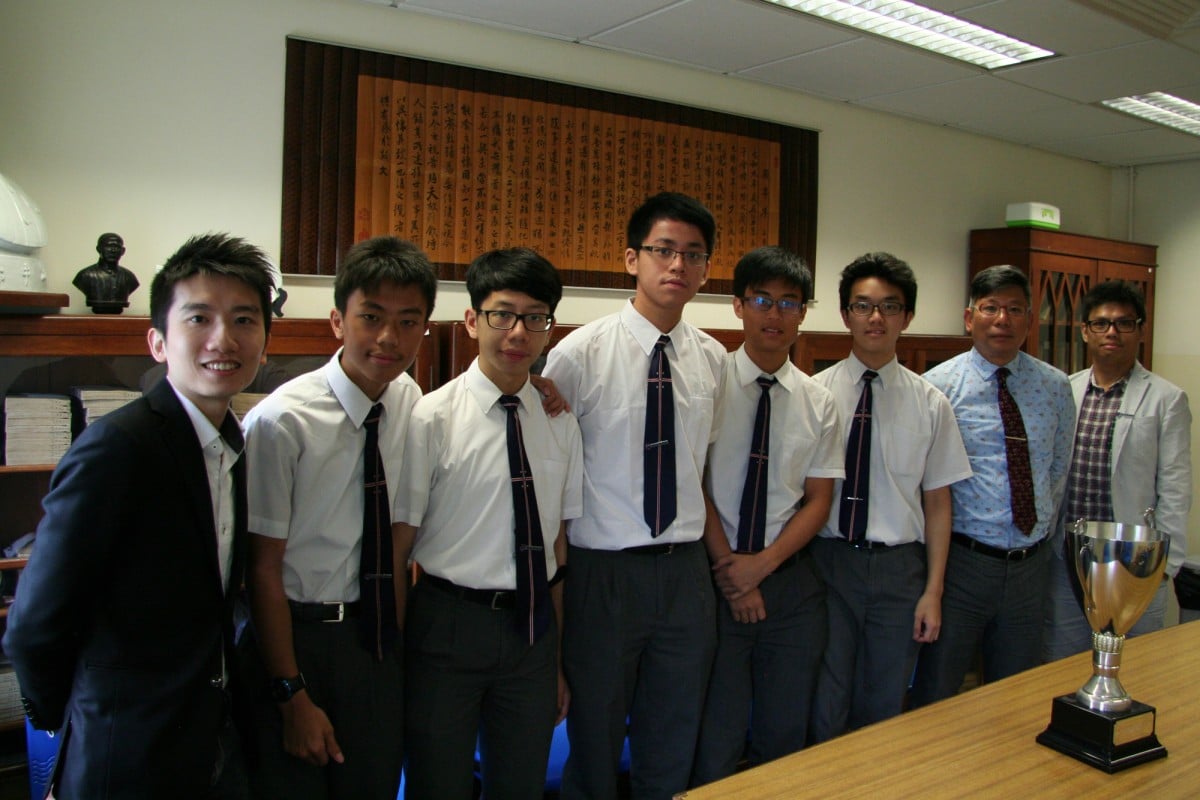
Hong Kong Bar Association’s top debaters present the argument for the debate team
It can be super stressful to get up onstage in front of a crowd and have your views be judged, but for these champion debaters, that's half the fun
 The team from Wah Yan College (L-R) Coach Johnathan Lam Chun-him, Go Ka-lok, Tsoi Wan-cheung, Nicky Lee Chi-hon, Lee Chun-hei, Johnson Cheung Chun-wai, teacher Chan Kwok-chuen, and advisor Jack Ng
The team from Wah Yan College (L-R) Coach Johnathan Lam Chun-him, Go Ka-lok, Tsoi Wan-cheung, Nicky Lee Chi-hon, Lee Chun-hei, Johnson Cheung Chun-wai, teacher Chan Kwok-chuen, and advisor Jack NgBy secondary school, a lot of people already have a background in music or sports. However, debating is something that most students start only in secondary school, and not always because they want to.
We spoke to the winning teams from this year’s Hong Kong Bar Association (HKBA) Debating Competition, and quite a few of them admitted they didn’t start debating voluntarily: sometimes their parents suggested it, and sometimes their classmates pushed them.
Debating can be fun, and even weird at times. Just listen to some of the best debaters in Hong Kong, and one coach, explain why you should consider it.
Become better at liberal studies than your teacher is
Johnathan Lam Chun-him is the coach of the Wah Yan College (Hong Kong) debate team, the winners of the Chinese category. Lam was on the debate team himself when he studied there, and he says debating requires a lot of research into a topic, usually one tied to current events. Since liberal studies also deals with current events, debating can give you a boost in the subject.
Lam offered this story as proof: “Two students told me that for their final liberal studies assignment, all they had to do was write out all the research they had already done for a debate, almost word-for-word, and that was enough to complete the assignment,” he said.
“For example, after our debate about the controversy over building an incinerator on Shek Kwu Chau, we could tell you all the details about that proposal: how much it would cost, what engineering measures were needed, how long it would take to build, what kinds of designs were being considered, which countries already had incinerators … We could tell you all of that on the spot.” This “inside knowledge” that debaters get would be hard to find anywhere else.
“If you follow the news about incinerators in Hong Kong, you’re not going to learn how Germany is using their incinerators, or what Tokyo has done with their urban incinerators, but you learn a lot about this if you had to research this for a debate,” Lam says. “So, it’s possible our debaters would know more about a certain topic than the teacher does.
Go Ka-lok, a Form Four student, is also a member of the Wah Yan team. He says when he did an assignment about political reform in Hong Kong, his teacher thought he must have followed the news closely, but “that wasn’t the case; I learned about this stuff while researching debates.”
Learn to handle failure, even if you lose because the adjudicator doesn’t like your socks
In a debate, the adjudicators will listen to both sides and decide which side made the better argument. That means it is, by definition, subjective; there’s no finish line or times to compare.
And some adjudicators can have unusual criteria, says Johnathan Lam, who has been coaching the Wah Yan College team for years.
“We’ve heard comments that our debaters should all be wearing the same-coloured socks, or using the same kind of water bottle,” he said. “We actually had an adjudicator tell us: ‘Don’t use all different water bottles next time. It doesn’t look good on stage.’.”
Lam says teachers tend to focus more on presentation: how debaters pronounce words, how quickly they speak, how you look on stage. Former debaters, meanwhile, will focus more on content and logic.
To deal with that, Lam advises his students to not just try to win an adjudicator over, but to also avoid giving the adjudicator an excuse to take points away from them.
You get to act like a cool movie lawyer
Debating may not sound as thrilling as a basketball game, but it can be exciting. Think about lawyers arguing their case in movies and TV shows.
Natalie Wong Yui-ting is a Form Five student at St Paul’s Secondary School, and her team won the English division of the HKBA’s debating competition. She says the free debate, the part when debaters can just get up and argue their cases without having to worry about who goes first, drove her to tears.
“That’s the most tense and challenging part of the debate. My mind went blank, and I couldn’t think of what to say,” Natalie says. “I felt guilty, because I was afraid I had dragged down our team performance and that would lead to us not getting any prizes. When I went into the room for refreshments, I had tears in my ears.”
Natalie started debating when she was in Form Two, and she’s been hooked ever since, because of the adrenaline rush the events give her.
The teams at this year’s competition also got the rare opportunity to debate at the High Court. Jade Wong Yan-to, a Form Five debater from St Paul’s, was very excited about this.
“To debate in front of the chief justice [Geoffrey Ma Tao-li] is a great honour for me. To have debated in front of him is … God’s grace, I don’t know what else to say. I was very happy,” she said. “The place where we were standing that day? You don’t get to stand there if you’re not a lawyer.”